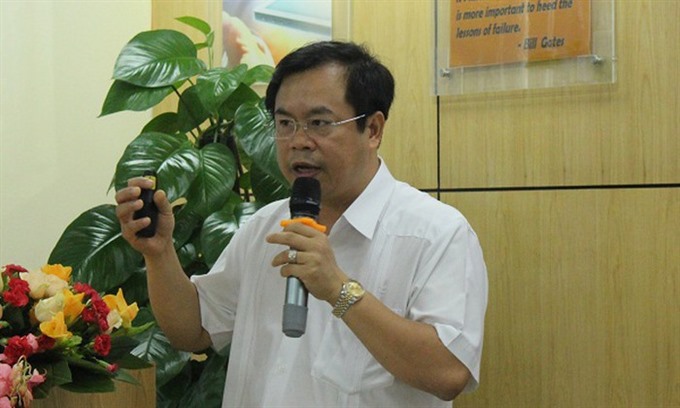.jfif) Opinion
Opinion

Vương Quốc Thắng, Director of the Centre for Enabling Start-ups and Knowledge Transfer from the Hà Nội National University, talks to the newspaper Thời báo Kinh Tế Việt
 |
| Vương Quốc Thắng. — Photo kinhtedothi.vn |
Vương Quốc Thắng, Director of the Centre for Enabling Start-ups and Knowledge Transfer from the Hà Nội National University, talks to the newspaper Thời báo Kinh Tế Việt
What are the most notable successes that the centre has achieved since its foundation?
The Hà Nội National University was established in 2011. But in March 2017 it was assigned with a new mission: to establish the Centre for Enabling Start Ups and Knowledge Transfer. And since then its official name was change to Việt Nam National University-Centre for Enabling for Start-ups and Knowledge Transfer or VNU-CSK.
Key missions assigned to the CSK are to promote innovation, support start ups, transfer knowledge and conduct the matching of science and technology demand inside and outside the Việt Nam National University (VNU).
For more than a year, the VNU-CSK has conducted many activities to promote innovation and creativity as well as the start-up spirit within the VNU and in the community at large.
The CSK has organised its monthly Café Business Start-up with the objective of linking all resources within the CSK to support the start-up movement.
One of our key objectives is to support all start-up projects nation wide, including the organisation of training workshops for new start-ups. However, I have to admit that the number of successful start-ups is not many. The biggest challenge we have been facing is that we don’t have much space for group working, which hampers the incubation of new start-ups.
Will you please talk a bit in detail about the supporting environment for young start-ups?
I should say that young people nowadays have many innovative ideas, but they are facing difficulties in setting up their own start-ups. I should say, nowadays the eco-system for start-ups in Việt
In other countries in the world, start-ups have received a lot of support from universities. And adding to that, a strong relationship has been established between universities and enterprises in order to create a creative space and links to encourage start-ups to develop in accordance with each enterprise’s strengths.
In your opinion, what should the universities do to promote the Vietnamese start-up core values?
In my opinion, there are three factors which are essential for start-ups in all nations to grow and develop.
First, technology science is the foundation for all start-ups. If a nation wants to move forward, it must have advanced science. In our country, almost 99 percent of Vietnamese enterprises are small and medium enterprises. So if hi-tech is applied in these enterprises’ activities, I’m sure their productivity will be very high. And the task/mission of universities is to transfer the latest scientific development to help the enterprises raise their productivity.
Second, human resources which are well-educated and have good work ethic are two important elements in raising labour productivity.
Third, the Vietnamese Government has adopted very good policies to encourage the development of start-ups. The Law on Small and Medium Enterprises, the Project 844 on supporting start ups by 2025; and the Project 1665 to support school children and students to set up their own start-ups by 2025 have become a driving force for many Vietnamese young people to form their own start-ups.
What should we do to have many more young and competent Vietnamese entrepreneurs in our society?
In my opinion, for university students we should focus on students in their final year of their study.
For students at secondary and high schools, in my opinion, we should provide them with knowledge and skills to become good and competent citizens in the future. And of course, we can give them some talks about their future career, including their dream to have their own start ups.— VNS




